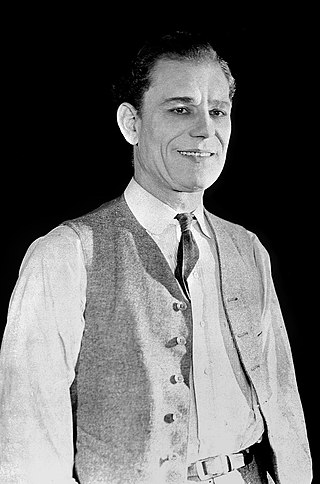
Leonidas Frank "Lon" Chaney was an American actor and makeup artist. He is regarded as one of the most versatile and powerful actors of cinema, renowned for his characterizations of tortured, often grotesque and afflicted, characters and for his groundbreaking artistry with makeup. Chaney was known for his starring roles in such silent horror films as The Hunchback of Notre Dame (1923) and The Phantom of the Opera (1925). His ability to transform himself using makeup techniques that he developed earned him the nickname "The Man of a Thousand Faces".

He Who Gets Slapped is a 1924 American silent psychological thriller film starring Lon Chaney, Norma Shearer, and John Gilbert, and directed by Victor Sjöström. The film was written by Victor Seastrom and Carey Wilson, based on the Russian play He Who Gets Slapped by playwright Leonid Andreyev, which was completed by Andreyev in August 1915, two months before its world premiere at the Moscow Art Theatre on October 27, 1915. A critically successful Broadway production, using an English language translation of the original Russian by Gregory Zilboorg, was staged in 1922, premiering at the Garrick Theatre on January 9, 1922, with Richard Bennett (actor) playing the "HE" role on stage. The Russian original was made into a Russian movie in 1916.

The Unknown is a 1927 American silent horror film directed by Tod Browning, and starring Lon Chaney as carnival knife thrower "Alonzo the Armless" and Joan Crawford as his beloved carnival girl Nanon. Originally titled Alonzo the Armless, filming took place from February 7 to March 18, 1927 on a $217,000 budget.

The Penalty is an American psychological thriller crime film starring Lon Chaney and originally released in 1920 by Goldwyn Pictures. The movie was directed by Wallace Worsley, and written by Philip Lonergan and Charles Kenyon, based upon the pulp novel by Gouverneur Morris. The supporting cast includes Charles Clary, Doris Pawn, Jim Mason, and Claire Adams. The copyright for the film was owned by Gouverneur Morris, who wrote the novel on which the film was based. The budget for the film was $88,868.00. Portions of the film were shot in San Francisco.

A Blind Bargain is a 1922 American silent horror film starring Lon Chaney and Raymond McKee, released through Goldwyn Pictures. The film was directed by Wallace Worsley and is based on Barry Pain's 1897 novel The Octave of Claudius. Lon Chaney played a dual role in the film, as both Dr. Lamb and "the Ape Man", one of Chaney's few "true horror films". The claim that Wallace Beery appeared as an ape-man uncredited has never been proven, but does persist in many sources.

Laugh, Clown, Laugh is a 1928 American silent drama film starring Lon Chaney and Loretta Young. The movie was directed by Herbert Brenon and produced by Irving G. Thalberg for MGM Pictures. A sound version of this film was released in the second half of 1928 and featured a synchronized musical score with sound effects. The film was written by Elizabeth Meehan, based on the 1923 Broadway stage production Laugh, Clown, Laugh by David Belasco and Tom Cushing, which in turn was based on the 1919 play Ridi, Pagliaccio by Fausto Maria Martini.

Danger, Go Slow is a 1918 American silent comedy film directed by Robert Z. Leonard, and starring Mae Murray, Jack Mulhall and Lon Chaney. Robert Z. Leonard and Mae Murray co-wrote the screenplay together. The film is today considered lost.

While the City Sleeps is a 1928 American synchronized sound crime drama film about a tough New York City police detective, played by Lon Chaney, out to catch a murdering gangster. While the film has no audible dialog, it was released with a synchronized musical score with sound effects using the sound-on-film Western Electric Sound System process. The film was directed by Jack Conway, written by Andrew Percival Younger, and co-starred Anita Page, Carroll Nye, Wheeler Oakman, and Mae Busch.
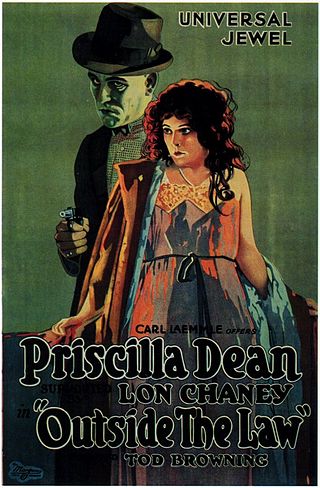
Outside the Law is a 1920 American pre-Code crime film produced, directed and co-written by Tod Browning and starring Priscilla Dean, Lon Chaney and Wheeler Oakman.

The Blackbird is a 1926 American silent crime film directed by Tod Browning and starring Lon Chaney. The screenplay was written by Waldemar Young, based on a story "The Mockingbird" by Tod Browning. Cedric Gibbons and Arnold Gillespie handled the set design. Makeup man Cecil Holland also played one of the old men living at the mission. Character actors Eddie Sturgis and Willie Fung appeared in several other Lon Chaney movies during this time period. The film took 31 days to shoot at a cost of $166,000. The tagline was "Lon Chaney in his successor to The Unholy Three". Stills on the internet shows Chaney in his dual role. In April 2012, the film became available on DVD from the Warner Archive collection.

The Road to Mandalay is a 1926 American silent drama film directed by Tod Browning and starring Lon Chaney, Owen Moore, and Lois Moran. It was written by Elliott Clawson, based on a story idea by Tod Browning and Herman Mankiewicz. The script's original shooting title was Singapore. The film took 28 days to complete at a cost of $209,000. The worldwide box office gross was $724,000. Some stills exist showing Chaney's makeup as Singapore Joe.
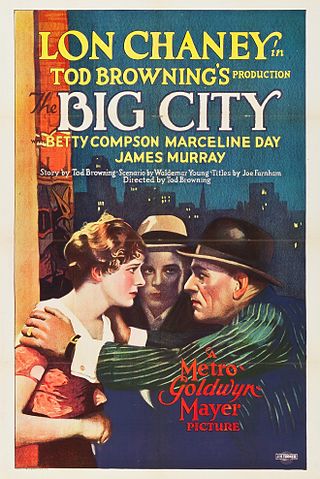
The Big City is a 1928 American silent crime film directed by Tod Browning and starring Lon Chaney. Waldemar Young wrote the screenplay, based on a story by Tod Browning. The film is now lost.
Stronger Than Death is a 1915 American silent drama film directed by Joe De Grasse, written by Bess Meredyth, and featuring Lon Chaney and Arthur Shirley. The film is notable for featuring two expatriate Australian actors together in the cast, Louise Lovely and Arthur Shirley. This was Louise Lovely's first American film - indeed it was the first time the actor, whose real name was Louise Carbasse, was credited as "Louise Lovely". The stage name was given to her by Carl Laemmle. Chaney had a relatively small role in this film as the attorney.
Dolly's Scoop is a 1916 American silent drama film directed by Joe De Grasse and featuring Lon Chaney. It was written by Ida May Park, based on a story by Hugh Weir. This was one of the few silent films that subtitled the actors' dialogue at the bottom of the screen, instead of using title cards. Also, this was one of the only Lon Chaney films in which Chaney wound up getting the girl at the end of the picture. A still exists showing Lon Chaney in the role of the reporter, Dan Fisher.
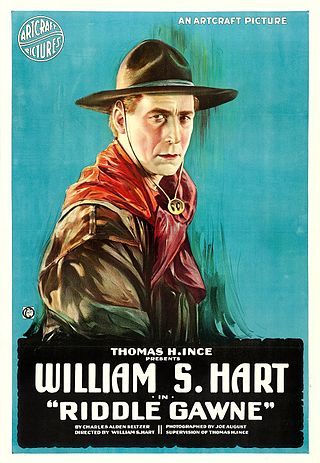
Riddle Gawne is a 1918 American silent Western film directed by William S. Hart and Lambert Hillyer, and featuring William S. Hart, Katherine MacDonald and Lon Chaney. The film was co-produced by William S. Hart and Thomas H. Ince. The screenplay was written by Charles Alden Seltzer from his earlier novel The Vengeance of Jefferson Gawne. Chaney historian Jon C. Mirsalis claims that William S. Hart contributed greatly to the screenplay but all other sources credit the writing of the screenplay solely to Charles Alden Seltzer.
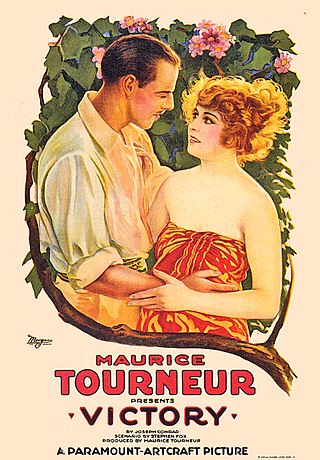
Victory is a surviving 1919 American action film directed by Maurice Tourneur and starring Jack Holt, Seena Owen, Lon Chaney, Wallace Beery and Bull Montana. The film is an adaptation of the 1915 eponymous novel by Joseph Conrad. The screenplay was written by Jules Furthman and Ben Carré was the art director.

The Tower of Lies is a 1925 American silent drama film directed by Victor Sjöström. It was written by Agnes Christine Johnston and Max Marcin, based upon Selma Lagerlöf's 1914 novel The Emperor of Portugallia. The film was supposed to be called The Emperor of Portugallia, but was later changed to The Tower of Lies.

All the Brothers Were Valiant is a 1923 American silent sea adventure and romantic drama film starring Lon Chaney. The film was produced and distributed by Metro Pictures corporation and directed by Irvin Willat. The cast also features Malcolm McGregor, Billie Dove and Robert McKim. The screenplay was written by Julien Josephson, based on the eponymous novel by Ben Ames Williams. The film was also known as Cold Courage.

A Man's Country is a 1919 silent Western drama film directed by Henry Kolker, and starring Alma Rubens, Alan Roscoe, and Lon Chaney. It was written by Richard Schayer based on a screen story by John Lynch. The poster's tagline was "A forceful and spectacular drama of the primitive West in the days of the Gold Rush, when men fought hard, women lived fast and human life was cheap."
Bondage is a 1917 American silent drama film written and directed by Ida May Park, and starring Dorothy Phillips, William Stowell, Gretchen Lederer and J.B. MacLaughlin.


















